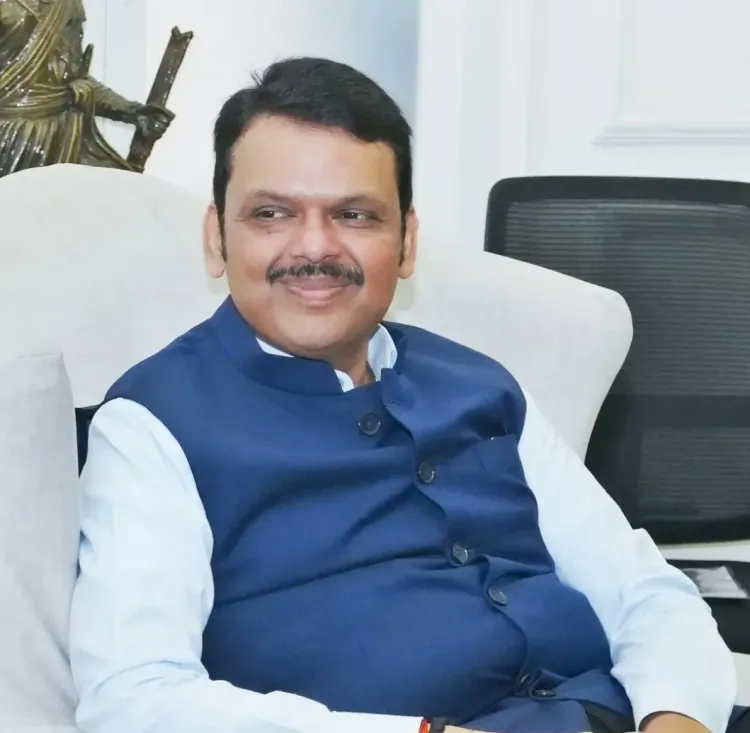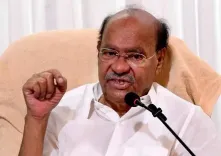Maharashtra Farmers to Receive Extra Rs 3,000 Annually Under Namo Shetkari Sanman Nidhi Yojana

Synopsis
The Maharashtra government has announced an increase in financial assistance for farmers by providing an extra Rs 3,000 annually under the Namo Shetkari Sanman Nidhi Yojana, alongside the existing Rs 6,000 from the Pradhan Mantri Kisan Samman Nidhi Yojana, totaling Rs 15,000 in annual aid.
Key Takeaways
- Maharashtra farmers to receive an additional Rs 3,000 annually.
- Combined total financial assistance of Rs 15,000 from both schemes.
- Focus on sustainable agriculture with solar pumps and water management projects.
- Wainganga-Nalganga project to benefit drought-affected districts.
- No electricity bills for farmers for the next 5 years.
Nagpur, Feb 24 (NationPress) The Maharashtra government is set to enhance its support for farmers by providing an additional subsidy of Rs 3,000 under the Namo Shetkari Sanman Nidhi Yojana. This will supplement the existing Rs 6,000 they currently receive.
Farmers in Maharashtra also benefit from Rs 6,000 each year under the Pradhan Mantri Kisan Samman Nidhi Yojana. Thus, with these two initiatives combined, the total annual financial assistance for farmers in Maharashtra will amount to Rs 15,000, as announced by Chief Minister Devendra Fadnavis.
“PM Narendra Modi Ji's 'PM Kisan Samman Nidhi' has emerged as a vital support for farmers, ensuring their financial stability and dignity. Additionally, under the 'NaMo Shetkari Samman Yojana' introduced by the state government, the annual subsidy of Rs 6,000 provided to farmers will soon see an increase of Rs 3,000. This will guarantee that a total of Rs 15,000 is deposited each year into farmers' accounts through these two schemes, enhancing their financial security,” stated the chief minister during the distribution of the 19th instalment of the Pradhan Mantri Kisan Samman Nidhi Yojana.
“Through transformative initiatives such as the Jalyukt Shivar Abhiyan, Baliraja Jal Sanjeevani Yojana, Swatantrya Sainik, and Nanaji Deshmukh Krishi Sanjeevani Yojana, we have already invested Rs 6,000 crore in Maharashtra’s agricultural sector. With an additional Rs 6,000 crore investment, we reaffirm our dedication to empowering farmers and ensuring a prosperous future for agriculture,” remarked the chief minister.
The Chief Minister highlighted that with support from the World Bank, the 'SMART' scheme is revolutionizing Maharashtra’s agricultural sector by strengthening value chains, SMEs, and agribusiness investments. The 'Agri Stack' scheme is also transforming farming through digitisation, currently covering 54 percent of farmers, with plans for full integration to create a future-ready agricultural ecosystem.
“To assist farmers with free electricity, over 2 lakh solar pumps have been installed, promoting sustainability. This initiative enhances financial inclusion in rural areas while ensuring cost-effective energy solutions for agriculture. Maharashtra is advancing sustainable water management with 150 approved conservation projects. The Wainganga-Nalganga project aims to irrigate 10 lakh acres in Vidarbha, demonstrating the government's commitment to farmers' prosperity,” he added.
The chief minister mentioned that the Wainganga-Nalganga river linking project is underway, which will significantly improve agriculture in Vidarbha.
This project will utilize the wasted water from the Gosekhurd dam, transporting it up to 550 km through the Wainganga river to the Nalganga river in Buldhana district.
This initiative will benefit drought-affected areas across 7 districts, including Nagpur, Amravati, Wardha, Akola, and Buldhana, with 10 lakh hectares of land being brought under irrigation.
He additionally informed that the state government has resolved not to collect electricity bills from farmers for the next 5 years.
A solar pump scheme is currently being implemented for farmers, with 1 lakh farmers receiving solar pumps in the past year alone. He further stated that farmers who purchase solar pumps will not have to worry about electricity bills for the next 25 years.
He noted that more than 150 irrigation schemes have received administrative approval in the last two and a half years.





